|
|
|
Sort Order |
|
|
|
Items / Page
|
|
|
|
|
|
|
| Srl | Item |
| 1 |
ID:
073146
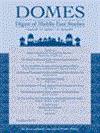

|
|
|
|
|
| Publication |
Hampshire, Ashgate, 2006.
|
| Description |
xvi, 234p.hbk
|
| Standard Number |
0754644812
|
|
|
|
|
|
|
|
|
|
|
|
Copies: C:1/I:0,R:0,Q:0
Circulation
| Accession# | Call# | Current Location | Status | Policy | Location |
| 051501 | 973.931/HUN 051501 | Main | On Shelf | General | |
|
|
|
|
| 2 |
ID:
158665
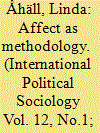

|
|
|
|
|
| Summary/Abstract |
International relations scholars are increasingly paying attention to “the emotional” as a way to understand global politics. What is often missing from these conversations is feminist knowledge on affect, and also discussions about methodology. By presenting a feminist methodological approach to the affective-discursive to analyze the politics of emotion, this paper aims to fill this gap. It starts by discussing feminist critiques of the “affective turn.” Then, a methodological framework of gender, discourse, and affect as a structure that “goes-without-saying” is presented. Hemmings’ concept of affective dissonance is used as a tool guiding a feminist curiosity, useful to zoom in on the political puzzle of what emotion (in its broadest sense) does. The third section draws on two examples of being emotional about violent “Woman” to illustrate how moments of affective dissonance spark a feminist curiosity about gender, agency, and political violence. In conclusion, the paper argues that feminist knowledge on affect offers a way to re-tune, reset, and reimagine research on the politics of emotion. By prioritizing affect as methodology, feminist knowledge should be valuable for critical endeavors interested in changing the status quo, no matter if the political puzzle is about gender or not.
|
|
|
|
|
|
|
|
|
|
|
|
|
|
|
|
| 3 |
ID:
119284
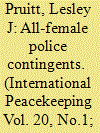

|
|
|
|
|
| Publication |
2013.
|
| Summary/Abstract |
This article focuses on women's involvement in peacekeeping operations and the introduction in 2007 of an all-female formed police unit (FFPU). Possible benefits and challenges of deploying all-female contingents in peace operations are considered and feminist theories of international relations are drawn upon to evaluate arguments for including women in peace and security missions. Media discourses on the Indian FFPU deployed to Liberia in 2007 are analysed, revealing a potential to reshape attitudes about the role of women in peace and security, and emphasizing that femininity need not be incompatible with strength and capacity for protection.
|
|
|
|
|
|
|
|
|
|
|
|
|
|
|
|
| 4 |
ID:
098991


|
|
|
|
|
| Publication |
2010.
|
| Summary/Abstract |
This article argues that one of the many 'idiosyncrasies' of the Israeli case, namely Israel's continuing, violent conflict with its Arab neighbours, is of highly influential relevance to the issue of gender relations. Viewed by many Israeli Jews as a struggle for the very existence of the Jewish state, the Arab-Israeli conflict has overshadowed most other civil and social issues, rendering them 'secondary' to the primary concern of securing the safe existence of the state. This has pushed such pressing issues as gender equality and women's rights aside, thus allowing for the perpetuation of discriminatory, sometimes rather repressive treatment of women in Israel. The most blatant expression of this is the turning of the struggle for civil marriage and divorce into a non-issue. Following a short introduction of the relevant political context, we discuss women's positivist and legal status, then conclude with an analysis of the women's movement, highlighting the emergence of religious feminism.
|
|
|
|
|
|
|
|
|
|
|
|
|
|
|
|
| 5 |
ID:
193150
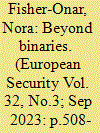

|
|
|
|
|
| Summary/Abstract |
This conclusion to the special issue notes the persistent use of binary frames in conceptions of (European) security. Such frames reify and limit our ability to make sense of key security challenges, not least by occluding their gendered and racialised dimensions. Therefore, it asks: How to move beyond binaries towards a more nuanced, inclusive and impactful conception of (European) security? Developing an answer via synthetic engagement of the articles in this collection – and their sources in gender and postcolonial studies – it argues that we can begin to challenge binaries with a relational approach operationalised by linking three concepts: intersectional positionality, performativity and allyship. By thus acknowledging the plural and performative thrust of intersecting security stances, the pieces in this collection point to the promise of situationally appropriate forms of allyship across positions, bringing a broader range of voices and insights to security agendas.
|
|
|
|
|
|
|
|
|
|
|
|
|
|
|
|
| 6 |
ID:
193472
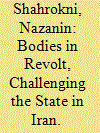

|
|
|
|
|
| Summary/Abstract |
The protests that erupted across Iran in 2022 after the death of a woman arrested for noncompliance with a headscarf requirement were not only about religious dress codes. They were a culmination of years of growing discontent over broader questions involving the place of women in the Islamic Republic and other grievances about the reach of an overbearing state and perceived social and political injustices. The erosion of civil society has made it difficult to sustain the protests’ momentum, as the state moves to co-opt businesses and the public into enforcing its decrees, but the uprising is part of a longer-term, nonlinear process of dissent-driven change in Iran.
|
|
|
|
|
|
|
|
|
|
|
|
|
|
|
|
| 7 |
ID:
177190


|
|
|
|
|
| Summary/Abstract |
In Hinduism, sindoor is a symbol of a married woman’s chastity, love and fidelity towards her husband. This potent mark inscribed on the forehead and in the parting of a woman’s hair serves as a reminder of her heterosexual identity, unavailability to other men, and the ownership of her body by her husband. Problematising how this heteropatriarchal imperative has complicated the bodily boundaries between the personal, social and cultural, this article explores the religious, nationalist and transnational politics of the appropriation of sindoor. The article analyses literary texts, Indian cinema classics and advertisements to critically explore how the sindoor mark is constituted by a complex interplay of race, gender, sexuality, religion, class, caste and nationality, inviting one to collaborate in the perpetuation of the doing and undoing of feminism.
|
|
|
|
|
|
|
|
|
|
|
|
|
|
|
|
| 8 |
ID:
171303
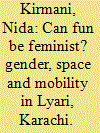

|
|
|
|
|
| Summary/Abstract |
The densely populated, multi-ethnic area of Lyari in Karachi is one of the city’s original settlements. The area has become infamous as the site of an ongoing conflict between criminal gangs, political parties and law enforcement agencies for over a decade, and, for this reason, Lyari has been labelled as one of several ‘no-go areas’ in the city. However, for the residents of Lyari, the ways in which they understand their part of the city far exceed these facile labels. While at times their neighbourhoods do become fearful spaces, they are also places of comfort, familiarity and fun. This article explores the multiple ways in which women and girls experience and understand this area. In particular, it documents the various ways in which they express and experience enjoyment in their everyday lives and during exceptional moments. Based on extensive interviews and participant observation in several neighbourhoods, the research shifts attention away from solely using violence as a lens to understand urban space and away from seeing women mainly as victims of violence. Focusing on the pursuit of fun and enjoyment as an area of academic inquiry can be an important way to show how women push against and challenge patriarchal boundaries. By highlighting women’s and girls’ own creative navigations and engagements with their locality and the city, this paper brings new insights into discussions of gender and urban marginalisation more generally.
|
|
|
|
|
|
|
|
|
|
|
|
|
|
|
|
| 9 |
ID:
051660
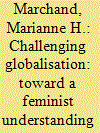

|
|
|
|
|
| Publication |
Dec 2003.
|
| Summary/Abstract |
'Given the success of Naomi Klein with her book No Logo and Noreena Hertz's The Silent Takeover, can we infer from this that feminists are finding themselves in the limelight of the anti-globalisation movement?' With this question a reporter of the Dutch magazine Op Gelijke Voet approached me about two years ago.
|
|
|
|
|
|
|
|
|
|
|
|
|
|
|
|
| 10 |
ID:
096305


|
|
|
|
|
| Publication |
2010.
|
| Summary/Abstract |
Choice feminism is motivated by a fear of politics. It arises in response to three common criticisms of feminism: that feminism is too radical, too exclusionary, and too judgmental. In response, choice feminism offers a worldview that does not challenge the status quo, that promises to include all women regardless of their choices, and that abstains from judgment altogether. Moreover, it enables feminists to sidestep the difficulties of making the personal political: making judgments and demanding change of friends, family, and lovers. Yet judgment, exclusion, and calls for change are unavoidable parts of politics. If feminists are not to withdraw from political life altogether, we have to acknowledge the difficulty of engaging in politics. Political claims are partial; we will inevitably exclude, offend, or alienate some of those whom we should wish to have as allies. The political concerns and dilemmas to which choice feminism responds are very real. However, we can take seriously the political motivations behind choice feminism without withdrawing from politics. Instead, we need to complement an acknowledgment of the political dilemmas facing feminists with a celebration of the pleasures of engaging in politics with those who differ from and disagree with us.
|
|
|
|
|
|
|
|
|
|
|
|
|
|
|
|
| 11 |
ID:
173398


|
|
|
|
|
| Summary/Abstract |
Forestalling sureties about what constitutes violence and feminism and the relationships between violence and feminism have been significant themes in the work of feminist International Relations theorist Marysia Zalewski. I follow how Zalewski, through her work and work with others including myself, interrupts well-trodden ‘trails’ of violence and feminism to open up thinking about both. I consider how her provocative work on violence and particularly feminist violence prefigures and advances cutting-edge critical thought on violence as represented in the ‘Histories of Violence’ project. What I call her ‘palimpsestic’ or multilayered and intertextual approach to violence reveals it as not only destructive, but also productive in terms of breaking with deadening conventions. I also consider her conceptualisation of feminist violence as both epistemic and militant over time in relation to some contemporary feminist insurgencies, the kinds of insurgencies that serve as her muses for breaking out of forms of ‘secured’ feminism and opening space for unbounded feminist thought. Consistent with her insistence that theory (and writing) should provide uncomfortable openings, not comforting foreclosures, I end not with a conclusion about her work, but rather echo her call to resist the kind of ‘knowing’ that suffocates critical thinking and (re)generative feminist thought.
|
|
|
|
|
|
|
|
|
|
|
|
|
|
|
|
| 12 |
ID:
172151
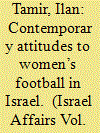

|
|
|
|
|
| Summary/Abstract |
The development in women’s sports in general, and women’s football in particular, has attracted extensive research due to, among other things, the high popularity of football, which functioned as an exclusively male domain for many years. This article examines attitudes towards women’s football in Israel, reflected in readers’ comments to related sport news items. Analysis of the responses to all the items related to women’s football posted in 2019 on sports and news websites, reveals mechanisms of fierce resistance manifested in disparaging and degrading attitudes towards women’s football and all factors involved in this sport. Some commenters emphasised women’s anomalous presence in football by restricting women to roles in the domestic and sexual spheres, while others explained women’s presence on football pitches by obliterating the gendered nature of women’s football, even to the point of equating the women with animals and beasts. Yet others blamed women players for the discrimination they experience on the football pitches, identifying the cause as ‘feminist terror.’
|
|
|
|
|
|
|
|
|
|
|
|
|
|
|
|
| 13 |
ID:
183711
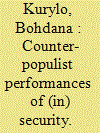

|
|
|
|
|
| Summary/Abstract |
IR scholarship has recently seen a burgeoning interest in the right-wing populist politics of security, showing that it tends to align with the international ultraconservative mobilisation against ‘gender ideology’. In contrast, this article investigates how local feminist actors can resist right-wing populist constructions of (in)security by introducing counter-populist discourses and aesthetics of security. I analyse the case of Poland, which presents two competing populist performances of (in)security: the Independence March organised by right-wing groups on Poland's Independence Day and the Women's Strike protests against the near-total ban on abortion. The article draws on Judith Butler's theory of the performative politics of public assembly, which elucidates how the political subject of ‘the people’ can emerge as bodies come together to make security demands through both verbal and non-verbal acts. I argue that the feminist movement used the vehicle of populist performance to subvert the exclusionary constructions of (in)security by right-wing populists. In the process, it introduced a different conception of security in the struggle for a ‘livable life’. The study expands the understanding of the relationship between populism, security and feminism in IR by exploring how the populist politics of security is differently enacted by everyday agents in local contexts.
|
|
|
|
|
|
|
|
|
|
|
|
|
|
|
|
| 14 |
ID:
105924
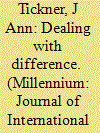

|
|
|
|
|
| Publication |
2011.
|
| Summary/Abstract |
This address suggests some avenues through which IR scholars from a variety of methodological approaches and different geographical locations might better dialogue with each other in mutually respectful ways. It begins by briefly revisiting IR's great debates since they represent the way the discipline has traditionally defined itself. It claims that these debates have centred on challenging the predominance of a US-centred discipline and its commitment to neo-positivist methodologies. Drawing on postcolonial and feminist literatures, it then offers some suggestions as to how might envisage an IR that is built on more global foundations and on a more pluralist understanding of what we define as scientific knowledge. It concludes with some thoughts on possible paths towards placing different scientific traditions on a more equal and mutually respectful footing.
|
|
|
|
|
|
|
|
|
|
|
|
|
|
|
|
| 15 |
ID:
169243
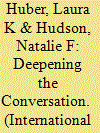

|
|
|
|
|
| Summary/Abstract |
Scholarship on international police reform and Women, Peace and Security (WPS) has flourished in the last decade and the potential for engagement across these two bodies of literature is promising. Given the increased use of police personnel in international peace missions and emphasis on gender mainstreaming policies, the need for assessing the impact of these two trends has never been greater. Thus, this paper seeks to bridge gaps between the mainstream policing scholarship and feminist scholars focused on post-conflict peacebuilding police reforms. We explore how feminist scholars can engage with policing literature’s technocratic language and ‘in the field’ experience as well as how policing scholars can interact with feminist scholars to transform traditional approaches to security in the context of the WPS Agenda. We demonstrate the benefits of increased dialogue and interaction by highlighting the common and diverging challenges in both fields in three areas: the design, implementation, and evaluation. Finally, to illustrate the dynamic intersection of these areas of study and practice, we examine the transnational policing efforts to gender mainstream the Liberian National Police (LNP) in the context of the UN Mission in Liberia (UNMIL).
|
|
|
|
|
|
|
|
|
|
|
|
|
|
|
|
| 16 |
ID:
171300
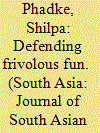

|
|
|
|
|
| Summary/Abstract |
Can fun be a serious politics in feminist struggles? That is the question that animates this paper. While claims for the economic and political participation of women have gained increasing legitimacy, the demand for fun may often be seen not just as frivolous, but also as undermining the seriousness of the feminist project itself. The paper engages with three feminist campaigns, two in India and one in Pakistan, that assert women’s rights to occupy the public for fun. The paper refutes critiques that suggest that feminist campaigns to claim public space in the city are illustrative of neo-liberal subjecthood and reflect the birth of new entrepreneurial selves. It also reflects on contemporary feminist debates in India around what counts as feminist, arguing that claims for fun might in fact be central to a feminist politics in the twenty-first century.
|
|
|
|
|
|
|
|
|
|
|
|
|
|
|
|
| 17 |
ID:
142475
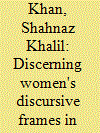

|
|
|
|
|
| Summary/Abstract |
This article challenges the notion that Kashmiri women are just silent observers/victims of an ongoing conflict and militarisation of Jammu and Kashmir. Women have utilised and impacted terrestrial public spaces, but there has been an impasse to creating a viable women's movement in the state. This analysis of digital discourses about and by Kashmiri women between 2010 and 2012 shows a discernible presence of women's discursive highways which serve to manoeuvre through the clamour of competing Indian, Pakistani and Kashmiri nationalisms. Kashmiri women can be heard, they are speaking out, and this article examines their discursive landscapes and what role, if any, Islamic discourses have in CyberKashmir.
|
|
|
|
|
|
|
|
|
|
|
|
|
|
|
|
| 18 |
ID:
164976
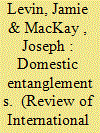

|
|
|
|
|
| Summary/Abstract |
This article revisits the Hobbesian account of the state of nature and the formation of states, attending to Hobbes’s account of the family. Drawing on feminist readings, we find in the Leviathan an account of the family as a natural political community. We contend specifically that a focus on conceptions of family life in the Leviathan, and in works by Hobbes’s early modern peers, points to the role of the family as a site of socialisation in the prelude to early state formation and in the formation of political hierarchies more generally – including, we suggest, the formation of international hierarchies. These accounts have thus far been missing from International Relations theory. Contra conventional IR theoretic readings of the Leviathan, the Hobbesian state of nature contains the seeds of both anarchy and hierarchy, as overlapping social configurations. While anarchy emerges clearly in the famous condition of ‘war of all against all’, hierarchy also exists in Hobbes’s depiction of family life as a naturally occurring proto-state setting. On the basis of this contemporary feminist analysis of a classic text, we consider implications for the emerging ‘new hierarchy studies’ in IR.
|
|
|
|
|
|
|
|
|
|
|
|
|
|
|
|
| 19 |
ID:
171111
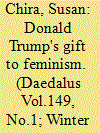

|
|
|
|
|
| Summary/Abstract |
Donald Trump's surprise win in 2016 galvanized once-politically quiescent women and jolted those who had believed second-wave feminist victories were enduring. This “resistance” drew on two potent forces: the passion of the newly awakened, primarily grassroots participants; and the organizing experience of professionals and institutions determined to channel that passion into sustainable electoral and policy gains. The movement expanded beyond the political to encompass the social and cultural spheres and gave women of color a place in the spotlight. As women ran for national, state, and local office in record numbers, the #MeToo movement toppled men who once harassed with impunity. Record numbers of women won in the 2018 midterms, retaking the U.S. House of Representatives for the Democrats, and six women declared their candidacy for president in 2020. But it remains unclear whether these gains will be lasting and overcome remaining ambivalence about women and power.
|
|
|
|
|
|
|
|
|
|
|
|
|
|
|
|
| 20 |
ID:
175157
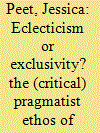

|
|
|
|
|
| Summary/Abstract |
Eclecticism in International Relations (IR) claims to reject the rigid boundaries set by various theoretical traditions, yet, in practice, it falls short of moving the field “beyond paradigms” and tends to produce analytical exclusivity rather than eclecticism. This exclusivity is the result of Sil and Katzenstein’s investment in tenets of American pragmatism. These tenets favor consensus and universalism, leading to the reproduction and exclusivity of the theoretical status quo. Dissolving paradigmatic boundaries requires a more critical form of pragmatism. Drawing on the common origins of feminism and pragmatism paired with the contemporary feminist concept of intersectionality, this essay proposes a critical pragmatist ethos and an intersectional analytic eclecticism. This can produce a more inclusive form of analytic eclecticism and render visible the power dynamics that shape experiences as well as academic scholarship. Only when analytic eclecticism is informed by intersectionality and a critical pragmatism might it actually move IR “beyond paradigms.”
|
|
|
|
|
|
|
|
|
|
|
|
|
|
|
|
|
|
|
|
|